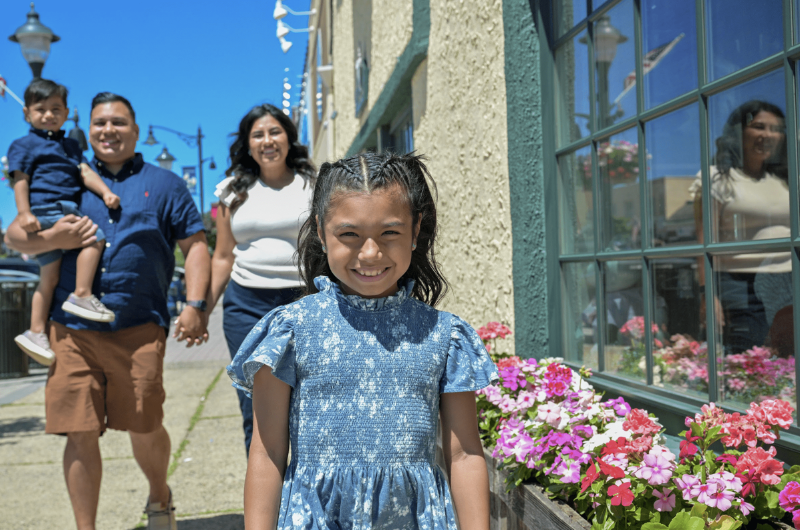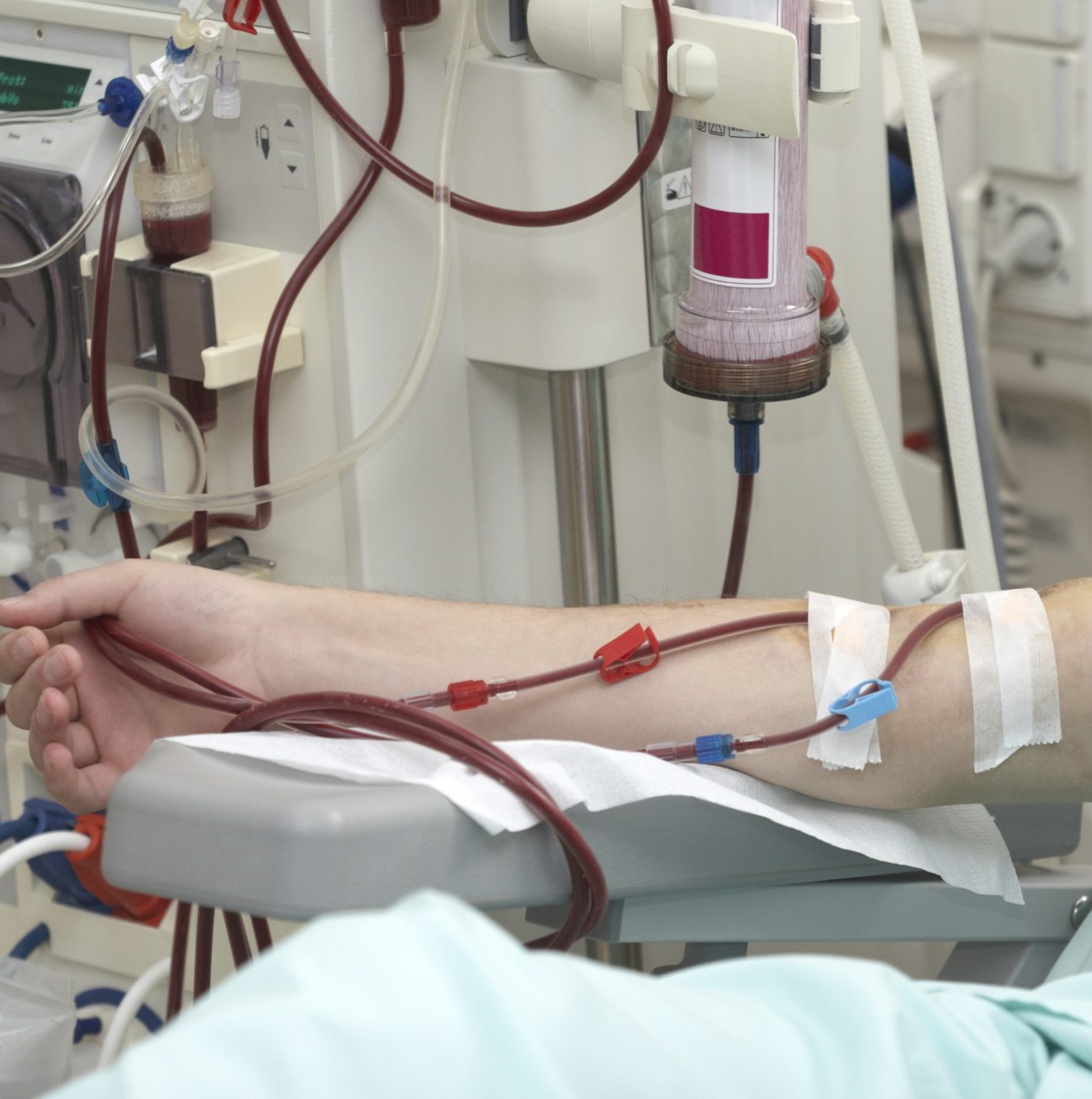Denville Girl Gets New Lease on Life With Kidney Transplant

July 23, 2024
Zoe Cerna was like any other toddler until she turned 23 months old. Not long before her second birthday, her eyes started gradually swelling. Soon after, she woke up one morning with a dry diaper and a bellyache. Her parents knew something serious was happening, so they took her straight to the Pediatric Emergency Department at Joseph M. Sanzari Children's Hospital in Hackensack.
But Zoe’s medical crisis was just the beginning of an often-harrowing journey through severe kidney disease and its treatments—including dialysis and a kidney transplant at Hackensack University Medical Center—that brought together an array of surgeons, pediatric nephrologists—including Kenneth Lieberman, M.D., division chief of pediatric nephrology at Joseph M. Sanzari Children’s Hospital— and Michael J. Goldstein, M.D., transplant surgeon. Together, they shepherded the now 8-year-old back to stable health.
“Our higher need has been met at Hackensack Meridian,” says Zoe’s mother, Maria. “We’ve been blessed to work with an incredible, compassionate team.”
Short Remission From Kidney Failure
Within months of Zoe’s initial diagnosis in 2018—and after steroid treatment failed—doctors performed a kidney biopsy that showed that she had a form of nephrotic syndrome called focal segmental glomerulosclerosis (FSGS), a rarer and more aggressive type of nephrotic syndrome. While FSGS is sometimes genetic, other times the cause is idiopathic (i.e. unknown).
Treatment with tacrolimus, a drug which can affect the immune system, brought much-needed normalcy to Zoe and her family, who were reeling from frequent hospitalizations. But the relief was short-lived: by the end of 2021, when Zoe was 5, the treatment stopped working. Once again, the little girl was in and out of the hospital with extreme swelling and other signs of kidney failure.
Dialysis three times a week was the necessary next step, but Hackensack specialists knew a kidney transplant couldn’t be far behind.
“That’s hard for any sized human, but really hard for a kindergarten kid,” says Namrata G. Jain, M.D., medical director for Pediatric Kidney Transplant at the Children’s Hospital. “We knew she had a pretty aggressive disease because she went from fairly normal kidney function to needing dialysis within six to eight months.”
A Unique Approach to Kidney Transplant
Zoe’s case continued to pose unique challenges. Not only did her kidneys shut down, but the continued protein loss from her native kidneys could endanger a transplanted kidney. Richard Schlussel, M.D., co-director of pediatric urology for Hackensack Meridian Health, removed her existing kidneys even before a new one was found to help decrease risk of recurrence of the FSGS, and to prevent blood clots to her transplant kidney. Blood clots are a risk as a result of persistent high loss of good protein (i.e. anti-thrombin III) in the urine.
The procedure, done with minimally invasive robotic techniques to promote quicker recovery, set Zoe up for success in more ways than one. Dr. Schlussel collaborated with transplant doctors to ensure the cuts he made aligned with the incisions that would be needed during Zoe’s eventual transplant.
“Because her kidneys were malfunctioning like that, they were actually hurting her as opposed to helping her,” Dr. Schlussel says. “It goes against our nature to remove kidneys, especially before transplant, but it was very necessary.”
Another hiccup occurred in the search for a kidney donor. While Zoe’s parents were deemed a tissue match, other biological factors prevented their organs from being suitable. With the determined little girl’s blessing, her parents took to social media to find another living donor, and the transplant took place in August 2021.
A Full Life After Kidney Transplant
Typically, someone who receives a kidney transplant requires no additional treatment for their urinary system to work properly. But in Zoe’s case, the transplant didn’t represent a cure. As with many non-genetic FSGS patients, her condition quickly recurred within days of the transplant. The transplant team had prepared for this, and aggressively treated the recurrence of FSGS with treatments, including plasmapheresis—a process that removes immune cells believed to fuel FSGS—and intravenous medications to help treat the recurrence. This all enabled Zoe to once again reach remission.
About 25% of the pediatric kidney transplants performed at Hackensack University Medical Center since 2021 have been in children with non-genetic FSGS, and all of the patients are doing well, Dr. Jain said. Plasmapheresis treatment is another standout feature of Hackensack’s pediatric nephrology program and is not widely available for small children.
Zoe finished second grade last June and is living life to the fullest. She and her family have traveled extensively the last couple of years—including visiting extended family in Ecuador—and the kind, creative girl loves playing with her 3-year-old brother, Santiago, and the family’s labradoodle, Rex.
Zoe undergoes frequent checkups to keep tabs on her health and takes immunosuppressants to prevent rejection of her new kidney and recurrence of her FSGS.
“We don’t take anything for granted,” says Zoe’s father, Luis. “We want to give her the opportunity to explore different things and spend time with family. We’re also allowing her to guide us to where she wants to be. At the end of the day, she has a chronic illness, and we have to follow her lead.”
Next Steps & Resources
- Meet our sources: Namrata G. Jain, M.D.; Richard Schlussel, M.D.; Kenneth Lieberman, M.D.
- To make an appointment with a pediatric nephrologist near you, call 800-822-8905 or visit our website.
- Learn more about our nationally ranked pediatric nephrology, pediatric transplant, or pediatric urology programming at Hackensack Meridian Children’s Health. For more on our rankings.
The material provided through HealthU is intended to be used as general information only and should not replace the advice of your physician. Always consult your physician for individual care.






